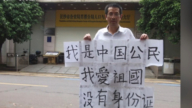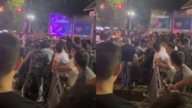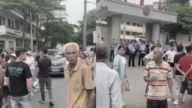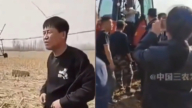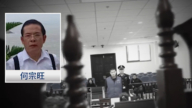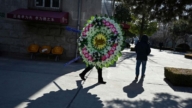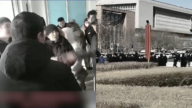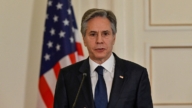【新唐人2012年11月08日讯】十八大前北京如临大敌,当局启动环京“护城河工程”,利用武警,安保人员,志愿者等严查进京道口,过滤进京人员。地方官员因此也倍感压力,成都甚至出现官员拿钱做饵,要访民别去北京。
11月5号《新华社》报导说,周永康“通过视频”检查了天津、山西、内蒙古、辽宁、山东等地实施的环京“护城河工程”和现场安检勤务情况。他还强调,要坚决防止所谓危险人员、危险物品和危险车辆进入北京。
所谓的“护城河工程”,是1996年以来,北京市与周边6个省区市为“联合保卫首都”,而建立地区间联防、联控、联调、联打的工作模式,和工作机制。
“六四天网”创办人黄琦:“他所指的‘危险人员’大家众所周知,就是对现政府不是很高兴的这些人吧。包括一些上访的民众,异议人士,维权人士,还有他们所谓的‘恐怖份子’。他们的‘危险’实际上就是揭露他们受到的迫害,这就是他们最大的‘危险’吧。”
虽然当局实施严控措施,但是各地还是有许多访民勇闯“护城河”,进京喊冤。因此周永康还要求十八大的保安实施“属地管理,分级负责”,使得地方官员也倍感压力。四川成都市温江区涌泉镇就出现了官员用钱做饵,要失地农民蒋玉琼别去北京上访的离奇一幕。
失地农民 蒋玉琼儿子“他们是上个礼拜五到我们家,涌泉镇政府和开发商,政府说开发商愿意付23万。23万,他是开发商暂时拿了10万,放在我们社区那里,他说等我母亲回来之后再联系。”
失地农民蒋玉琼的儿子还表示,之前他母亲去北京上访过10次,然而3年来当地政府一直拖延欺骗,不给解决家里的失地问题。但十八大前明显感到地方官员的害怕,白天黑夜都有人监视他们。而现在这个“不见人不给钱”的做法,也让人心存疑虑。
蒋玉琼儿子:“但是我母亲就是怕他们没诚意,因为现在政府都是不讲信用的,我母亲可能现在在北京。”
“六四天网”创办人黄琦:“成都自从本月2日拉开了‘成都访民挺进北京大行动’之后,这个是民众自发拉开的。当局感到很恐惧,现在是很主动的抱着钱去农民家里面,哀求农民别去北京上访。实际上他们并不是为了解决问题,他们仅仅为了保住自己的乌纱帽而已。”
成都一位访民的丈夫郭应良也认为,地方当局所说的“解决问题”,是为了骗访民回来。
访民丈夫郭应良:“这个他们说解决问题,这是一种骗局,目地是把你骗回来,他是这个目地,骗回来过后、回来解决,回来过后就把你监控了。现在我也被监控了,昨晚上整个守我一个通宵,今天上午又有车子跟踪。”
几位勇闯“护城河”的访民对地方政府现在突然表态,承诺要解决问题都表示怀疑,因为之前的漫长上访路已经使他们对政府失去信任。
郭应良:“群众对共产党的干部太不满意了、太反对了。我也到了很多地方,看到写的‘立党为公,执政为民’,看到这些字,我都不晓得这些字他们怎么想出来写的,真正的干部不是这样子的。”
除了启动环京“护城河工程”过滤进京人员,当局还把所谓“危险人物”请出了北京。据了解,北京异见人士查建国、高洪明、何德普等人都被当局人员带走,离开北京“被旅游”;维权人士胡佳等被送往安徽;许志永、王荔蕻、曹顺利、徐永海等人也都陆续被当局人员24小时上岗监视。
采访/易如 编辑/尚燕 后制/君卓
**************************
China’s “Fosse Project” Filters Petitioners Entering Beijing
The imminent 18th Party Congress has put Beijing under
heavy security.
The Chinese Communist Party (CCP) regime has launched
a “Fosse Project” to filter people’s entry into Beijing.
Armed forces, security personnel and officially recruited
volunteers guard main intersections to examine people.
Local CCP authorities are under pressure, too.
Chengdu’s officials have even offered money in an attempt
to discourage local petitioners from going to Beijing.
On November 5, Xinhua News Agency stated that
Zhou Yongkang, “via live video”, had inspected regional
execution of the “Fosse Project” and on-site security checks.
The areas include Tianjin, Shanxi, Inner Mongolia,
Liaoning and Shandong.
Zhou has instructed to “resolutely prevent” so-called
dangerous persons, goods and vehicles from entering Beijing, said the news report.
The alleged “Fosse Project” was set up in 1996, covering
Beijing and six neighboring regions to “jointly safeguard the Capital”.
It was designed as a regional work mechanism that jointly
Defends, controls, mobilizes and combats targets.
Huang Qi (Founder, China 6.4 Tianwang Human Rights
Info Center): “We all know its definition of so-called ‘dangerous people’.
They are those whom the regime is unhappy with, including
petitioners, dissidents, right-activists, and alleged “terrorists".
To the regime, these people’s biggest “danger” is actually
their exposure of the persecutions they have suffered."
Under the authorities’ tightened control, petitioners across
China have still braved to break through the “Fosse” barrier into Beijing.
On the security work for the 18th Party Congress,
Zhou Yongkang has demanded that there be set up a
system of localizing all supervision and hierarchical control.
Zhou’s instruction has put local officials under great pressure.
In Wenjiang district of Chengdu, the town officials even
used money to coax Jiang Yuqiong, a local landless peasant, not to petition in Beijing.
Jiang Yuqiong’s son: “Last Friday, the town officials and
the property developer came to my home.
The officials said that the property developer
would like to pay RMB 230,000 yuan for the land.
They said they would prepay 100,000 yuan
but would have to see my mother back first."
Jiang Yuqiong’s son revealed that
his mother has petitioned in Beijing ten times.
However, local authorities have not really resolved
her land loss grievances over past three years.
Now, on the eve of the 18th Party Congress,
local officials have put the family under 24-hour surveillance.
They claimed that “no money would be given without seeing
Jiang Yuqiong back”, which sounds questionable.
Jiang Yuqiong’s son: “My mother just questions
their sincerity, for the government isn’t trustable.
Now, my mother may stay in Beijing.”
Huang Qi: “Chengdu petitioners voluntarily launched
a campaign of “forward into Beijing”, starting on November 2.
Local authorities have felt frightened.
They have carried money and visited petitioners’ homes,
asking them not to go to Beijing.
Of course they didn’t go resolving problems, it was just in
an attempt to keep their official positions secure."
Guo Yingliang, husband of a petitioner living in Chengdu,
reveals more inside story.
Local authorities’ having promised to “resolve grievances”
is just an excuse to coax petitioners back from Beijing, he says.
Guo Yingliang: “It’s their hoax claiming to solve the problem.
Their goal is to coax you back from Beijing.
But when you come back, you’ll be under their monitoring.
Now even I have been monitored. They monitored my home
all last night, and this morning they trailed me in a car.”
Several petitioners who have unblocked the official barrier
now openly doubt local authorities’ promises of resolving problems.
This is because they have lost trust in the regime after having
undergone years of petitioning.
Guo Yingliang: “The masses have too much dissatisfaction
with and opposition to CCP officials.
I’ve traveled many places and seen those slogans like
“the Party serves the public and governs for the people.”
I just don’t understand how they could image such words.
In fact, really good officials never need to do this.”
Moreover, CCP authorities have even purged some of the
“dangerous people” from Beijing.
Some dissidents including Zha Jianguo, Gao Hongming, and
He Depu were reportedly taken outside Beijing to “go traveling”.
Human rights activist Hu Jia was sent to Anhui Province.
Other rights defenders including Xu Zhiyong, Wang Lihong,
Cao Shunli and Xu Yonghai were all put under 24-hour surveillance.


